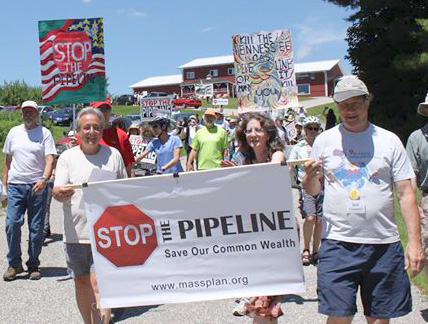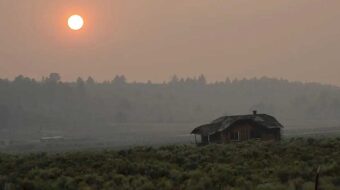
ASHFIELD, Mass. – This part of western Massachusetts is dotted with small towns – villages, really – and a population of farmers, retirees, dairy owners, writers, artists and artisans, and small business people who run stores or do landscaping, construction and home repair. Most of them live here because they like the quiet lifestyle integrated with the rural area’s beautiful four seasons. The mills and factories that once hired sizable local workforces all closed generations ago.
A peaceful, tolerant, mind-your-own-business kind of folk far removed from the agitations of everyday existence in the cities – hell, there’s not even cell phone service in Ashfield! What could disturb this bucolic image from a Saturday Evening Post illustration by Norman Rockwell?
A massive, high-pressure pipeline proposed by Tennessee Gas Pipeline Company, a subsidiary of Kinder Morgan, carrying shale gas – produced with the controversial fracking process – through 76 Ashfield properties, that’s what. And through other towns in Franklin County, and a whole parade of counties across the northern tier of the state, extending out to ports on the Atlantic coast. Our much vaunted “national energy independence” is little more than a patriotic slogan to disguise mega-oil profits from fossil fuel export abroad, leaving towns like Ashfield vulnerable to industrial disasters it never asked for.
Folks have been taking action. Back in February a map of the proposed pipeline turned up on the Internet. Since then, among these neighboring towns, more than a dozen so far have called town meetings and voted to reassert community rights as the ultimate authority before approving such projects.
One balmy Monday evening in late June, over 250 residents of Ashfield (out of a total town population of 1,800), packed the town hall to discuss and vote on two articles: one on the principle of community rights, and the second opposing and prohibiting Kinder Morgan’s pipeline plan.
This is old New England, where town hall democracy is taken literally and seriously.
The proposed articles would not become law, or legally binding. They would only carry the strong statement of an advisory recommendation. State and federal law still retain the power to override community sentiment. The pipeline also crosses some public lands, parks and forests, and those terms would have to be negotiated in any event. A state senator and representative, as well as a staff member for the area’s U.S. Rep. Richard Neal, attended the meeting. Their future actions will be carefully scrutinized.
Town citizens got up to say things like, “As you all know, I have never agreed with anything said by the previous speaker. But this is bigger than us. We must come together on the decisions that affect our lives.” After some vague language was deleted, Article I passed by a large majority.
As to the second article, on the pipeline itself, one older woman, seeking to sell her 40 acres so she could move in with her children, told of a buyer all lined up: a couple who saw her land as the perfect site for a boutique dairy enterprise. As soon as they heard about the pipeline, they withdrew the offer. What would happen to property values in the town?
A young fireman spoke: “We are simply not trained for these kinds of eruptions, explosions, and catastrophes.” How many leaks do we need, how many homes will need to be torn down, before Kinder Morgan says, “Oh, maybe this was a bad idea.”
Many in the audience wondered what one man expressed: “Why do I feel I have no control?” Another reminded the crowd, “The water that is contaminated here is the same water around the world.”
An eloquent speaker summed up the deep emotions of the crowd. “This vote is not just about us here today,” said Jane Shaney. “This is about every child and those to come, in this town and countless others across the country, who will be left with what we leave behind. We are, ultimately, visitors here. We would like to make sure we leave it intact, so that others may too experience what we so value today.”
Article II passed with a thunderous collective “Aye.” Only two timid souls faintly uttered their “Nay” votes. Without further business, the Ashfield town hall meeting adjourned, and everyone went home, an informed, activated citizenry whose voice insists on being heard.
Two websites are covering the pipeline story: www.massplan.org and www.nofrackedgasinmass.org.
Photo: Area residents kick off a 20-day relay-style march from Richmond to Dracut, Mass., to oppose the proposed Kinder Morgan/TGP pipeline, which would transport fracked natural gas to the Atlantic coast, July 6. Julia Blythe/Rolling March to Stop the Pipeline Facebook page
Corrected 7/9/14: A staff member for Rep. Richard Neal attended the town hall meeting, not a staffer for Rep. Jim McGovern as stated in a previous version. Rep. McGovern has said he strongly opposes the pipeline.

MOST POPULAR TODAY

High Court essentially bans demonstrations, freedom of assembly in Deep South

Zionist organizations leading campaign to stop ceasefire resolutions in D.C. area


U.S. imperialism’s ‘ironclad’ support for Israel increases fascist danger at home

UN warns that Israel is still blocking humanitarian aid to Gaza






Comments